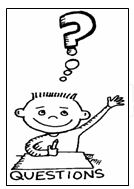问题
完形填空
 One night, I wondered what it would be like if I only asked questions. I decided that no matter what anyone said to me the next day, I would reply only with 36 . I loved to read about scientists and their discoveries, and I knew that scientists always started their research with a question. I hoped that I could become a scientist. Maybe by asking questions, I could train my mind to be 37 . I survived the morning easily. “Is there any egg?” I answered when my mother asked what I wanted for breakfast. “Is this seat taken?” I asked when my friend Mike asked where he was going to 38 on the bus. In the classroom, Mr. Black spoke slowly and clearly while I listened carefully. The problem had been part of my homework the night before. I wrote the answer on the board, “Could the answer be 361?” Mr. Black smiled and nodded. I thought,“How did I 39 to get through that?” I almost laughed because asking questions really was starting to become a 40 . I thought I had made it safely through the whole day, 41 what I had come to consider my experiment blew up at the dinner table when my dad asked me about my day. “What do I always do?” I replied. My parents looked at each other. My father 42 again. “Well, I hope you went to school,” he said. “Uhhh … why would you think otherwise?” I asked. My parents exchanged another 43 and were becoming annoyed. “Do you think questions are a good way to train your mind to be active?” I asked. “It 44 the question,” said my father. “Some questions are asked for 45 information. Those are good mind-training questions. Sometimes, people use questions to get the other person to say something. Sometimes people ask questions to get someone to agree with them. Those questions don’t really achieve anything.” “I guess my experiment didn’t work,” I said, and I told my father about my 46 . “I think it worked 47 !” my father said. “You made a discovery, didn’t you? What matters is that you have put your idea into practice.”
|
答案
小题1:D
小题1:C
小题1:B
小题1:D
小题1:A
小题1:C
小题1:A
小题1:A
小题1:D
小题1:B
小题1:B
小题1:C
小题1:考查名词:A. actions行动B. answers回答C. gestures手势D. questions问题,从第一句话的questions. 可知选D
小题1:考查形容词:通过提问可以使我的思维变快。选C
小题1:考查动词:从前面的“Is this seat taken?”可知填si,选B
小题1:考查词组:manage to do设法做到。选D
小题1:考查名词:问问题成了一个习惯(habit)。选A
小题1:前面说一天安全度过,后面说吃饭的时候遇到的问题,是转折。选C
小题1:考查动词:爸爸又试了一下。Try,选A
小题1:考查名词:父母交换了表情。选A
小题1:考查词组:depend on取决于,这取决于问题。选D
小题1:考查动词:一些问题问了是为了找到信息的。选B
小题1:考查名词:我告诉爸爸自己的想法。选B
小题1:考查副词:我想这很有效(perfectly)。选C
